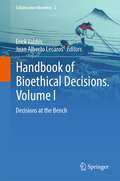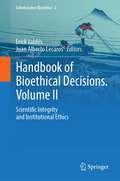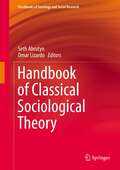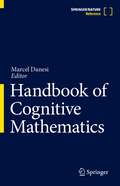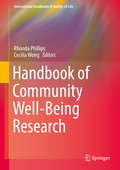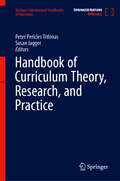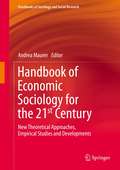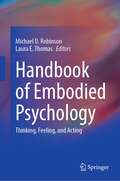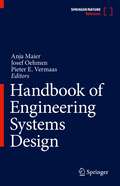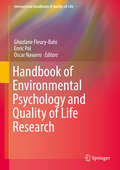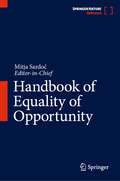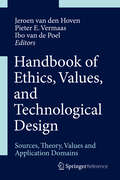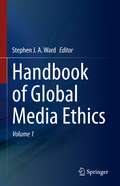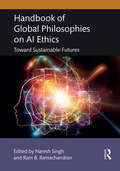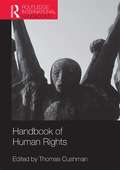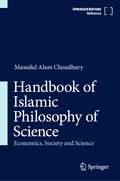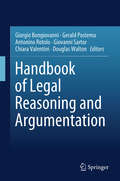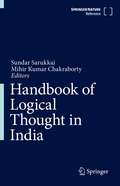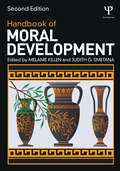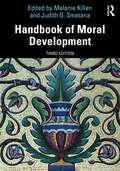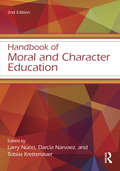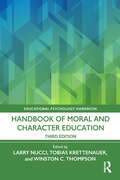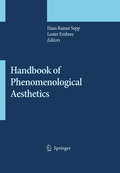- Table View
- List View
Handbook of Bioethical Decisions. Volume I: Decisions at the Bench (Collaborative Bioethics #2)
by Erick Valdés Juan Alberto LecarosThe Handbook of Bioethical Decisions is aimed at addressing and analyzing the most important ethical concerns and moral quandaries arisen in biomedical and scientific research. As such, it identifies and problematizes on a comprehensive range of ethical issues researchers must deal with in different critical contexts. Thus, the Handbook, Vol. I, may be helpful for them to make decisions and deliberate in complex practical scenarios. In this fashion, the volume reunites different points of view to give readers room enough to get a better knowledge and take their own position on pressing bioethical issues of the day. Consequently, this work seeks to engender dense ethical epistemology scientists can count on when conducting latest generation biomedical research. By bringing together an impressive array of contributions on the most important elements and categories for “at the bench” bioethical decisions as well as offering chapters by some of the most world renowned and prominent experts in bioethics, the Handbook, Vol. I, is a paradigmatic text in its area and a valuable resource for courses on bioethics, and biomedical research, as well as courses that discuss ethics and the biosciences at different professional levels, biomedical industry, pharmacological companies and the public sphere in general.
Handbook of Bioethical Decisions. Volume II: Scientific Integrity and Institutional Ethics (Collaborative Bioethics #3)
by Erick Valdés Juan Alberto LecarosThe Handbook of Bioethical Decisions Volume II addresses and analyzes the most important ethical concerns and moral quandaries related to scientific integrity and institutional ethics. It counts on two parts, Part One: Research Ethics, which addresses issues related to Scientific Integrity, Research Misconduct and Conducting Ethical Research, and Part Two: Institutional Ethics and Bioethics Committees, which explores Institutional Ethics issues, Ethics and Bioethics Committees’ roles and scopes, and Bioethical Issues in Institutional Ethics. Consequently, the Handbook, Vol. II, offers a remarkable collection of works by outstanding international experts on institutional and research ethics, in order for bioethics practitioners to obtain better elements to address key issues related to integrity in research as well as to decision-making processes. In this fashion, this volume is a valuable resource for professionals working on different bioethical and biomedical fields, such as, ethics and bioethics committees, health care institutions, biomedical and pharmacological companies, and academic settings, among others.Chapter 26 is available open access under a Creative Commons Attribution 4.0 International License via link.springer.com.
Handbook of Classical Sociological Theory (Handbooks of Sociology and Social Research)
by Seth Abrutyn Omar LizardoThis is the first handbook focussing on classical social theory. It offers extensive discussions of debates, arguments, and discussions in classical theory and how they have informed contemporary sociological theory. The book pushes against the conventional classical theory pedagogy, which often focused on single theorists and their contributions, and looks at isolating themes capturing the essence of the interest of classical theorists that seem to have relevance to modern research questions and theoretical traditions. This book presents new approaches to thinking about theory in relationship to sociological methods.
Handbook of Cognitive Mathematics
by Marcel DanesiCognitive mathematics provides insights into how mathematics works inside the brain and how it is interconnected with other faculties through so-called blending and other associative processes. This handbook is the first large collection of various aspects of cognitive mathematics to be amassed into a single title, covering decades of connection between mathematics and other figurative processes as they manifest themselves in language, art, and even algorithms. It will be of use to anyone working in math cognition and education, with each section of the handbook edited by an international leader in that field.
Handbook of Community Well-Being Research
by Rhonda Phillips Cecilia WongThis Handbook brings together foundational and leading-edge research exploring dimensions of improving quality of life in communities of place. Social indicators and other assessment techniques will be explored, including from the framework of community perspectives which is concerned with enhancing quality of life for community members. As part of this trans-disciplinary work, participation, engagement, and empowerment will be key concepts presented. Along with capacity building and service provision, these elements influence community well-being and will be considered along with subjective and objective assessment approaches. Researchers from around the globe share their work on this important topic of community well-being, bringing together a diverse array of disciplinary perspectives. Those working in the areas of public policy, community development, community and social psychology, urban and regional planning, and sustainable development will find this volume particularly useful for the array of approaches presented.
Handbook of Curriculum Theory, Research, and Practice (Springer International Handbooks of Education)
by Peter Pericles Trifonas Susan JaggerThis Handbook paints a portrait of what the international field of curriculum entails in theory, research and practice. It represents the field accurately and comprehensively by preserving the individual voices of curriculum theorist, researchers and practitioners in relation to the ideas, rules, and principles that have evolved out of the history of curriculum as theory, research and practice dealing with specific and general issues. Due to its approach to both specific and general curriculum issues, the chapters in this volume vary with respect to scope. Some engage the purposes and politics of schooling in general. Others focus on particular topics such as evaluation, the use of instructional objectives, or curriculum integration. They illustrate recurrent themes and historical antecedents and the curricular debates arising from and grounded in epistemological traditions. Furthermore, the issues raised in the handbook cut across a variety of subject areas and levels of educationand how curricular research and practice have developed over time. This includes the epistemological foundations of dominant ideas in the field around theory, research and practice that have led to marginalization based on race, class, gender, sexuality, ethnicity, age, religion, and ability. The book argues that basic curriculum issues extend well beyond schooling to include the concerns of anyone interested in how people come to acquire the knowledge, skills, and values that they do in relation to subjectivity and experience.
Handbook of Economic Sociology for the 21st Century: New Theoretical Approaches, Empirical Studies and Developments (Handbooks of Sociology and Social Research)
by Andrea MaurerThis handbook provides an overview on major developments that occurred in the field of economic sociology after its rebirth since the 1980s in the US. It offers new insights on the uniqueness of European economic sociology compared to US economic sociology which emerged at the end of the 20th century. The handbook presents economic sociology as a developing field which started with certain foundations as new economic sociology, widening the perspective by introducing social factors thereby focusing more on general belief systems, social forms of coordination and the relationships between society and the economy. It offers an outstanding portrait of the research field helping to identify major foundations and trajectories as well as new research perspectives for a globalized economic sociology. This makes the handbook appeal to specialized researchers of the field, researchers from other disciplines interested in economic phenomena, as well as graduate and postgraduate students.
Handbook of Education Systems in South Asia (Global Education Systems)
by Padma M. Sarangapani Rekha PappuThis handbook is an important reference work in understanding education systems in the South Asia region, their development trajectory, challenges and potential. The handbook includes the SAARC (South Asian Association for Regional Cooperation) countries for discussion---Afghanistan, Pakistan, India, Nepal, Bhutan, Bangladesh, and Sri Lanka---while also considering countries such as Myanmar and the Maldives that have considerable shared history in the region. Such a comparative perspective is largely absent within the literature given the present paucity of intra-regional interaction. South Asian education systems are viewed primarily through a development lens in terms of inequalities, challenges and responses. However, the development of modern institutions of education and the challenges that it faces requires cultural and historical understanding of indigenous traditions as well as indigenous modern thinkers and education movements. Therefore, this encompassing reference work covers indigenous education traditions, formal education systems, including school and preschool education, higher and professional education, education financing systems and structures, teacher education systems, addressing huge linguistic and other diversities, and marginalization within the formal education system, and pedagogy and curricula. All the countries in this region have their own unique geographical, cultural, economic and political character and histories of interest and significance, and have responded to common issues such as overcoming the colonial legacy, language diversity, or girls’ education, or minority rights in education, in uniquely different ways. The sections therefore include country-specific perspectives as far as possible to highlight these issues. Internationally renowned specialists of South Asian education systems have contributed to this important reference work, making it an invaluable resource for researchers and students of education interested in South Asia.
Handbook of Embodied Psychology: Thinking, Feeling, and Acting
by Michael D. Robinson Laura E. ThomasThis edited volume seeks to integrate research and scholarship on the topic of embodiment, with the idea being that thinking and feeling are often grounded in more concrete representations related to perception and action. The book centers on psychological approaches to embodiment and includes chapters speaking to development as well as clinical issues, though a larger number focus on topics related to cognition and neuroscience as well as social and personality psychology. These topical chapters are linked to theory-based chapters centered on interoception, grounded cognition, conceptual metaphor, and the extended mind thesis. Further, a concluding section speaks to critical issues such as replication concerns, alternative interpretations, and future directions. The final result is a carefully conceived product that is a comprehensive and well-integrated volume on the psychology of embodiment. The primary audience for this book is academic psychologists from many different areas of psychology (e.g., social, developmental, cognitive, clinical). The secondary audience consists of disciplines in which ideas related to embodied cognition figure prominently, such as counseling, education, biology, and philosophy.
Handbook of Engineering Systems Design
by Pieter E. Vermaas Anja Maier Josef OehmenThis handbook charts the new engineering paradigm of engineering systems. It brings together contributions from leading thinkers in the field and discusses the design, management and enabling policy of engineering systems. It contains explorations of core themes including technical and (socio-) organisational complexity, human behaviour and uncertainty. The text includes chapters on the education of future engineers, the way in which interventions can be designed, and presents a look to the future. This book follows the emergence of engineering systems, a new engineering paradigm that will help solve truly global challenges. This global approach is characterised by complex sociotechnical systems that are now co-dependent and highly integrated both functionally and technically as well as by a realisation that we all share the same: climate, natural resources, a highly integrated economical system and a responsibility for global sustainability goals. The new paradigm and approach requires the (re)designing of engineering systems that take into account the shifting dynamics of human behaviour, the influence of global stakeholders, and the need for system integration. The text is a reference point for scholars, engineers and policy leaders who are interested in broadening their current perspective on engineering systems design and in devising interventions to help shape societal futures.
Handbook of Environmental Psychology and Quality of Life Research
by Ghozlane Fleury-Bahi Enric Pol Oscar NavarroThis Handbook presents a broad overview of the current research carried out in environmental psychology which puts into perspective quality of life and relationships with living spaces, and shows how this original analytical framework can be used to understand different environmental and societal issues. Adopting an original approach, this Handbook focuses on the links with other specialties in psychology, especially social and health psychology, together with other disciplines such as geography, architecture, sociology, anthropology, urbanism and engineering. Faced with the problems of society which involve the quality of life of individuals and communities, it is fundamental to consider the relationships an individual has with his different living spaces. This issue of the links between quality of life and environment is becoming increasingly significant with, at a local level, problems resulting from different types of annoyances, such as pollution and noise, while, at a global level, there is the central question of climate change with its harmful consequences for humans and the planet. How can the impact on well-being of environmental nuisances and threats (for example, natural risks, pollution, and noise) be reduced? How can the quality of life within daily living spaces (home, cities, work environments) be improved? Why is it important to understand the psychological issues of our relationship with the global environment (climatic warming, ecological behaviours)? This Handbook is intended not only for students of various disciplines (geography, architecture, psychology, town planning, etc. ) but also for social decision-makers and players who will find in it both theoretical and methodological perspectives, so that psychological and environmental dimensions can be better taken into account in their working practices.
Handbook of Equality of Opportunity
by Mitja SardočThis Handbook provides an authoritative exposition of equality of opportunity. It presents the different concepts most commonly associated with equality of opportunity, and discusses the many problems dominating the controversies on equality of opportunity at the theoretical, policy or practical level. The chapters give a concise exposition of the different conceptions and basic concepts of equal opportunities. They clarify variables that are part of the 'algorithm of equal opportunities', e.g. opportunity, equality, non-discrimination, fairness, responsibility, chance and choice, excellence, qualifications, effort, talent, merit, desert, inequality, and risk. The idea of equality of opportunity has traditionally been associated with a set of largely unquestioned ideals, and over the last 50 years, it has been at the very centre of the major progressive social changes and firmly entrenched in political rhetoric. Yet, the idea of equality of opportunity is far from unquestionable or unproblematic as the only solid assumption different conceptions have in common is their rejection of fixed social relations but not hierarchy itself. Disagreements over the fundamental principles, criticism over the inefficiency of policies aiming to ensure equal opportunities, and objections to their unfairness, all pose questions that current conceptions answer in different ways. This Handbook examines a wide variety of questions about issues of motivation, procedures, genealogy, taxonomy, and compensation.
Handbook of Ethics, Values, and Technological Design
by Ibo van de Poel Pieter E. Vermaas Jeroen van den HovenThis handbook enumerates every aspect of incorporating moral and societal values into technology design, reflects the fact that the latter has moved on from strict functionality to become sensitive to moral and social values such as sustainability and accountability. Aimed at a broad readership that includes ethicists, policy makers and designers themselves, it proffers a detailed survey of how technological, and institutional, design must now reflect awareness of ethical factors such as sustainability, human well-being, privacy, democracy and justice, inclusivity, trust, accountability, and responsibility (both social and environmental). Edited by a trio of highly experienced academic philosophers with a specialized interest in the ethical dimensions of technology and human creativity, this syncretic handbook collates an array of published material and offers a studied, practical introduction to the field. The volume addresses myriad aspects at the intersection of technology design and ethics, enabling designers to adopt a constructive approach in anticipating, preventing, and resolving societal and ethical issues affecting their work. It covers underlying theory; discrete values such as democracy, human well-being, sustainability and justice; and application domains themselves, which include architecture, bio- and nanotechnology, and military hardware. As the first exhaustive survey of a field whose importance is characterized by almost exponential growth, it represents a compelling addition to a formerly atomized literature.
Handbook of Families in the Arab Gulf States (Gulf Studies #19)
by Md Mizanur Rahman Ziarat Hossain Kaltham Al-Ghanim Sharique UmarThis open access book collates and advances the body of knowledge about the factors, directions, and magnitudes of change in Arabian Gulf families from interdisciplinary perspectives. Family life across the globe is being impacted by unprecedented diversity in household living arrangements and by sweeping economic, cultural, and social change, and this is not an exception in the Gulf region. The book demarcates how Gulf families are experiencing many formidable challenges and undergoing profound changes due to speedy economic transformation, educational reforms, extensive use of social media, rapid urbanization, migration, women empowerment, and the intersections of popular culture from both the East and the West. Notwithstanding such challenges and changes, Gulf families often seem to retain and continue many of the traditional roles and functions of families in a sustained manner. It contributes to current debates that revolve around questions of what has changed, and what has stayed the same, in family structures in the region. Sweeping and comparative, the book provides avenues for offering practical solutions for policy interventions in Kuwait, the United Arab Emirates, Qatar, Bahrain, Oman, and Saudi Arabia. It is a key academic text for sociologists interested in transformations in the family in relation to politics, economics, consumption patterns, education, gender, law, social media, religion, culture, social reforms, and the state.
Handbook of Global Media Ethics
by Stephen J. A. WardThis handbook is one of the first comprehensive research and teaching tools for the developing area of global media ethics. The advent of new media that is global in reach and impact has created the need for a journalism ethics that is global in principles and aims. For many scholars, teachers and journalists, the existing journalism ethics, e.g. existing codes of ethics, is too parochial and national. It fails to provide adequate normative guidance for a media that is digital, global and practiced by professional and citizen. A global media ethics is being constructed to define what responsible public journalism means for a new global media era. Currently, scholars write texts and codes for global media, teach global media ethics, analyse how global issues should be covered, and gather together at conferences, round tables and meetings. However, the field lacks an authoritative handbook that presents the views of leading thinkers on the most important issues for global media ethics. This handbook is a milestone in the field, and a major contribution to media ethics.
Handbook of Global Philosophies on AI Ethics: Toward Sustainable Futures
by Naresh Singh Ram B. RamachandranThis book offers an exploration of the diverse perspectives shaping the future of artificial intelligence (AI), highlighting the influence of non-Western thinking in its development. What would the impact be if AI were developed with the wisdom of Ubuntu, the harmony of Confucian thought, or the Indian principle of Vasudhaiva Kutumbakam, "the world is one family", at its core? This thought-provoking collection brings together leading voices from around the globe to reimagine AI systems that are fair, ethical, and inclusive. Addressing critical issues such as bias, fairness, privacy, and existential risks, it challenges the status quo and envisions a future where AI reflects the values of all humanity—not just a select few. Exploring the influence of topics like religion, culture, and social movements, the book examines how these perspectives shape AI’s application in industries such as finance, education, and the military, while underscoring the importance of establishing robust ethical guardrails. Whether you’re a curious reader, a policy maker, a scholar, or a tech innovator, this book is your guide to understanding how different cultural perspectives can redefine AI ethics. It’s time to ask: what kind of world do we want AI to build for us all?
Handbook of Human Rights (Routledge International Handbooks)
by Thomas CushmanIn mapping out the field of human rights for those studying and researching within both humanities and social science disciplines, the Handbook of Human Rights not only provides a solid foundation for the reader who wants to learn the basic parameters of the field, but also promotes new thinking and frameworks for the study of human rights in the twenty-first century. The Handbook comprises over sixty individual contributions from key figures around the world, which are grouped according to eight key areas of discussion: foundations and critiques; new frameworks for understanding human rights; world religious traditions and human rights; social, economic, group, and collective rights; critical perspectives on human rights organizations, institutions, and practices; law and human rights; narrative and aesthetic dimension of rights; geographies of rights. In its presentation and analysis of the traditional core history and topics, critical perspectives, human rights culture, and current practice, this Handbook proves a valuable resource for all students and researchers with an interest in human rights.
Handbook of Islamic Philosophy of Science: Economics, Society and Science
by Masudul Alam ChoudhuryThis handbook provides a comprehensive overview of Islamic ethical issues within a wide spectrum of philosophy of science topics, examining the development of the model of moral inclusiveness in economics, science and society from ontological, epistemological and analytical perspectives. This paradigm takes the view that ethics is systemically endogenous, and can be studied by the most rigorous scientific analysis pertaining to diverse issues and problems of ethicality in socio-scientific inquiry. This handbook takes a sweeping transdisciplinary approach that is deeply phenomenological, to the nature and logic of scientific inquiry of, and in, the Qur’an. Such an approach invokes the episteme of the unity of knowledge in the socio-scientific systemic sense. The volumes' respective sections focus on the nature, logic, and role that ethics plays in formulating new vistas of alternative epistemic futures in Islamic economics, finance, and the social sciences. The ideas presented are situated within the broader context of the post-modernist, post-pandemic, and the post-Covid-19 epoch, while being aimed at conceptualising a distinctive new outlook of transdisciplinary intellection in Islamic philosophy. The content is rigorously conceptual, qualitative, quantitative, and applied. Covering a diversity of subject areas from philosophy of science, to economics and in socio-scientific context within the realm of Islamic philosophy, this forms a key text for scholars in these respective arenas, led by pioneering scholarship in Islamic studies.
Handbook of Legal Reasoning and Argumentation
by Douglas Walton Giovanni Sartor Antonino Rotolo Giorgio Bongiovanni Gerald Postema Chiara ValentiniThis handbook addresses legal reasoning and argumentation from a logical, philosophical and legal perspective. The main forms of legal reasoning and argumentation are covered in an exhaustive and critical fashion, and are analysed in connection with more general types (and problems) of reasoning. Accordingly, the subject matter of the handbook divides in three parts. The first one introduces and discusses the basic concepts of practical reasoning. The second one discusses the general structures and procedures of reasoning and argumentation that are relevant to legal discourse. The third one looks at their instantiations and developments of these aspects of argumentation as they are put to work in the law, in different areas and applications of legal reasoning.
Handbook of Logical Thought in India
by Sundar Sarukkai Mihir Kumar ChakrabortyThis collection of articles is unique in the way it approaches established material on the various logical traditions in India. Instead of classifying these traditions within Schools as is the usual approach, the material here is classified into sections based on themes ranging from Fundamentals of ancient logical traditions to logic in contemporary mathematics and computer science. This collection offers not only an introduction to the key themes in different logical traditions such as Nyaya, Buddhist and Jaina, it also highlights certain unique characteristics of these traditions as well as contribute new material in the relationship of logic to aesthetics, linguistics, Kashmir Saivism as well as the forgotten Tamil contribution to logic.
Handbook of Moral Development
by Judith G. Smetana Melanie KillenThe Handbook of Moral Development is the definitive source of theory and research on the development of morality. Since the publication of the first edition, ground-breaking approaches to studying the development of morality have re-invigorated debates about what it means to conceptualize and measure morality in early childhood, how children understand fairness and equality, what the evolutionary basis is for morality, and the role of culture. The contributors of this new edition grapple with these questions and provide answers for how morality originates, changes, evolves, and develops during childhood, adolescence, and into adulthood. Thoroughly updated and expanded, the second edition features new chapters that focus on: infancy neuroscience theory of mind moral personality and identity cooperation and culture gender, sexuality, prejudice and discrimination Reflecting the interdisciplinary nature of the study of moral development, this edition contains contributions from over 50 scholars in developmental science, cognitive psychology, social neuroscience, comparative psychology and evolution, and education.
Handbook of Moral Development
by Judith G. Smetana Melanie KillenThe Handbook of Moral Development is the definitive source of theory and research on the origins and development of morality in childhood and adolescence. It explores morality as fundamental to being human and enabling individuals to acquire social norms and develop social relationships that involve cooperation and mutual respect. Since the publication of the second edition, groundbreaking approaches to studying moral development have invigorated debates about how to conceptualize and measure morality in childhood and adolescence. The contributors of this new edition grapple with these questions from different theoretical perspectives and review cutting-edge research. The handbook, edited by Melanie Killen and Judith G. Smetana, includes chapters on parenting and socialization, values, emergence of prejudice and social exclusion, fairness and access to resources, moral reasoning and children’s rights, empathy, and prosocial behaviors. Morality is discussed in the context of families, peers, schools, and culture. Thoroughly updated and expanded, the third edition features new chapters on the following: • Morality in infancy and early childhood • Cognitive neuroscience perspectives on moral development • Social responsibility in the context of social and racial justice • Conceptions of economic and societal inequalities • Stereotypes, bias, and discrimination • Victimization and bullying in peer contexts Reflecting the interdisciplinary nature of the study of moral development, this edition contains contributions from sixty scholars in developmental science, social neuroscience, comparative and evolutionary psychology, and education, representing research conducted around the world. This book will be essential reading for scholars, educators, and students who are in the field of moral development, as well as social scientists, public health experts, and clinicians who are concerned with children and development.
Handbook of Moral and Character Education (Educational Psychology Handbook)
by Darcia Narvaez Larry Nucci Tobias KrettenauerThere is widespread agreement that schools should contribute to the moral development and character formation of their students. In fact, 80% of US states currently have mandates regarding character education. However, the pervasiveness of the support for moral and character education masks a high degree of controversy surrounding its meaning and methods. The purpose of this handbook is to supplant the prevalent ideological rhetoric of the field with a comprehensive, research-oriented volume that both describes the extensive changes that have occurred over the last fifteen years and points forward to the future. Now in its second edition, this book includes the latest applications of developmental and cognitive psychology to moral and character education from preschool to college settings, and much more.
Handbook of Moral and Character Education (Educational Psychology Handbook)
by Larry Nucci Tobias Krettenauer Winston C. ThompsonThe Handbook of Moral and Character Education offers a definitive, state-of-the-art synthesis of leading scholarship in moral and character education. A subject of international interest and the focus of numerous governmental curricular mandates, the moral development and character formation of students are increasingly recognized as an essential component of a well-rounded schooling experience. This comprehensive volume explores the philosophical, psychological, and educational issues that define the field; links robust theoretical and empirical foundations to effective classroom practice; highlights implications for civic engagement and social justice; and follows the lessons learned from moral and character education into contexts outside of schools.Fully revised and updated, this third edition features a refreshed research base, coverage of digital pedagogies, out-of-school programs, and informal learning, and discussions about the role of reason, emotion, cultural processes, and citizenship/democracy in education. Further, the book’s substantive emphasis on diversity and equity in the field results in greater racial, ethnic, and geographic representation among contributing authors, inclusion of historically marginalized school communities and student identities, and coverage of practices such as transformative social and emotional learning (SEL), restorative justice, and education for environmental sustainability.
Handbook of Phenomenological Aesthetics
by Lester Embree Hans Rainer SeppThe potentiality of phenomenological aesthetics is enormous, many figures have contributed to it during a time span of over a century, but this is the first work thoroughly to show its breadth, depth, and continuing fecundity. Moritz Geiger, Roman Ingarden, Fritz Kaufmann, Jean-Paul Sartre, Maurice Merleau-Ponty, and Mikel Dufrenne are the central figures and receive substantial treatment. A score of other influential individuals, including Antonio Banfi, Simone de Beauvoir, Oskar Becker, Jacques Derrida, Hans-Georg Gadamer, Martin Heidegger, Michel Henry, Dietrich von Hildebrand, Maurice Natanson, Nishida Kitaro, Jose Ortega y Gasset, Jan Patocka, Paul Ricoeur, Heinrich Rombach, Max Scheler, Alfred Schutz, Gustav Spet, and France Veber also have entries devoted to them. In addition, there are over two dozen entries on such topics such as dream, empathy, enjoyment, imagination, sensation, on style, ecology, gender, and interculturality, and then on areas including architecture, film, and theater. The introduction includes an extensive sketch of the history of phenomenological investigation in this sub-discipline of philosophy. All entries are written by the best relevant specialists, all the entries have bibliographies, and a selected bibliography for the whole is appended. This handbook will be the foundation for many more decades of investigation.
